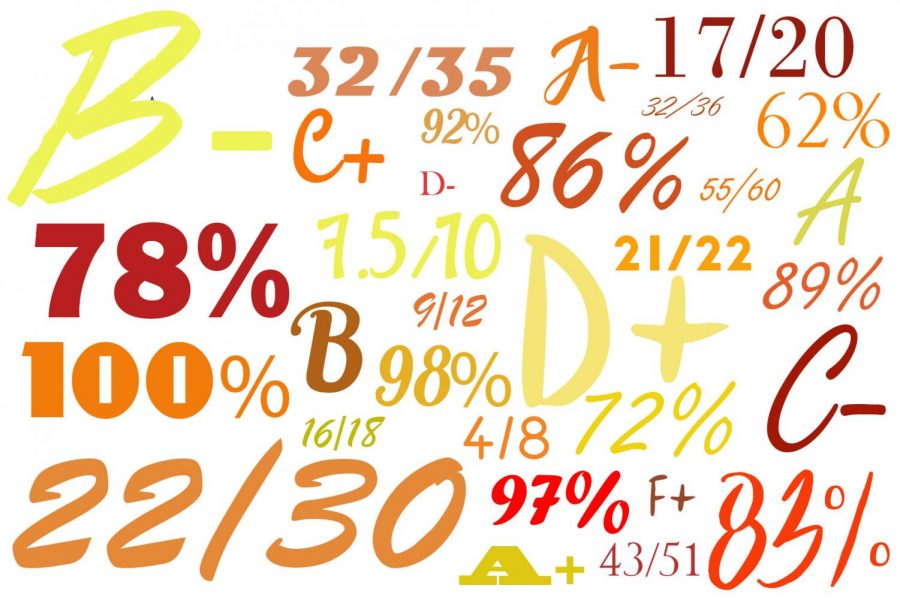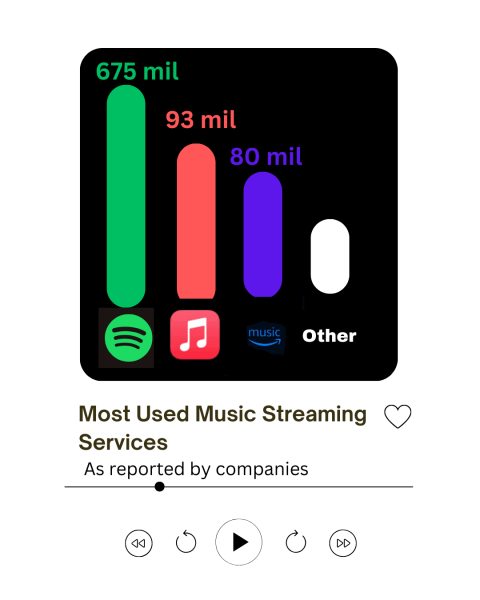To be successful, the numbers count
What does the phrase “It’s not about the number” even mean?
When teachers say this, they’re referencing the fact that students spend more time worrying about their grades than focusing on and remembering what they’re learning.
But, of course, it is about the number.
How else will I get into a good college?
What else are admission offices going to look at?
Maybe how many clubs I’m in? Or will they see what classes I took without looking at the grade I got in them? Is it about my personality more than my brain? Will I get into a good college after getting a C in a class, even if I know all of the information by the end of the year?
The answer to all of these questions is “no.”
There are many arguments about the most important part of a student’s college application. Is it the ACT score? The SAT score? Your GPA? The grades you actually receive in the classes you take? All of these “more important” aspects of your high-school life have one thing in common: each is determined with numbers.
According to collegeprep.com, a website that informs students about what colleges value the most, the top factors for college admissions have to do with numbers: grades in AP classes, admission test scores (ACT, SAT, etc.) and the grades in the other classes you take.
Other aspects of your application, such as extracurriculars, letters of recommendation, the essay students spend days on and your interest in the college are considered “factors of moderate importance.” These factors have nothing to do with numbers, so they are of less value.
As a straight-A student in my high school career as of now, I can promise you that I do not remember anything from biology freshman year. After being tested about all the stages of mitosis, I immediately forgot about it until finals came around, when I briefly reviewed the unit.
The only reason I put up with four hours of homework every night and six-to-seven hours of homework on the weekend is to get good grades, which will help me in the future. I don’t need to remember everything from biology in order to succeed in life. However, the grade I got in biology will help me achieve my goals.
I have many theories about why teachers use the phrase “It’s not about the number.” One is that they think it takes pressure off of students. For some, maybe it does, but the majority of the students I have talked to do not feel this way.
While learning is important and helps challenge your mind, in high school, the grade definitely feels more important than knowing that the domestication of camels changed trade in the Middle East because they did not need as much water to survive compared to horses.
This is why teachers saying “It’s not about the number” is preposterous.
And the new grading system being implemented in several classes, which does not tell students their percentage grade in their class, is designed to follow this reasoning.
Instead of receiving percentage grades in these classes, students may receive a score on a 0-5 scale, with five being the highest. In PowerSchool, there is no number grade shown, only their letter grade.
We are currently using this grading system in Drops of Ink, although our scale is 0-4. A few parents freaked out when we received our quarterly grades because it said we had a 0% in this class. This grading system does not bother me as much as I am taking Drops of Ink pass/fail, but some students in other classes I’ve talked to do not think this accurately represents their grade.
This new grading system only makes students more stressed. Because they are only able to see their letter grade in PowerSchool, they have no idea what kind of grade they need on an assignment or their final in order to get the grade they want.
One student, Ashley Born, a sophomore, is so frustrated with not being able to see her grade that she is considering dropping Spanish next year. During first semester, she said she did not know her grade and ended up with a B, which was not the grade she would have liked.
She also showed me that she received several fours on a test, and one three, but her test grade averaged out to be a three, so she received a B on the test even though the majority of her scores on that test were the highest possible.
Teachers who say it’s “not about the number” are wrong. The number is the most important aspect for getting into a college, and it allows students to properly measure their grades and where they should be in the future.









![Senior River Thompson joins the Jazz Ensemble by singing “That Old Black Magic” by Mercer and Arlen Arr. Mark Taylor, along with senior Annie Brody on guitar and junior Thomas Teixeira on bass, earning big applause. “[The concert had] great energy because it's the last [jazz concert] of the year,” Brody said.](https://www.lhsdoi.com/wp-content/uploads/2025/04/Eight-That-Old-Black-Magic-600x400.jpg)
![Mr. Abullh Ali, manager/assistant, helps open Queen Yemeni Coffee in downtown Libertyville at 606 North Milwaukee Ave. With the help of employees such as manager and LHS senior Yousef Taha, they are able to bring the Yemeni and Ethiopian culture to Libertyville by using their Queen spices, cinnamon and cardamom in their drinks such as Adani Chai, which is inspired by Sheda, the Queen of Yemen and Ethiopia. “The history of our coffee [is] a long history and we believe that Yemen and Ethiopia started the coffee and we are bringing something unique to the community,” Mr. Ali said.](https://www.lhsdoi.com/wp-content/uploads/2025/04/Photo-1-600x400.jpg)


